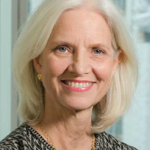During ACR Convergence 2022 in early November, the ACR honored a group of individuals who have made significant contributions to rheumatology research, education and patient care by announcing the recipients of the ACR’s 2022 Awards of Distinction, as well as the 2022 ACR Masters, recognized for their contributions to the field. See the November issue for the 2022 ACR Distinguished Fellows, the ARP Merit Award and the ARP Master recipients.
Presidential Gold Medal
Gold Medal is awarded in recognition of outstanding achievements in rheumatology over an entire career. This year’s award went to Betty Diamond, MD, director of the Institute of Molecular Medicine and Maureen and Ralph Nappi Professor at the Feinstein Institutes for Medical Research, Manhasset, N.Y., and professor of molecular medicine and medicine and director of the PhD and MD-PhD programs at the Donald and Barbara Zucker School of Medicine at Hofstra University/Northwell, Hempstead, N.Y.
“I am deeply honored by this award,” says Dr. Diamond. “My professional career has always been guided by both my passions and my principles. I cannot adequately convey how moved I am to realize that others recognize and value these traits. It is lovely.”
Dr. Diamond received her undergraduate education at Radcliffe College, Cambridge, Mass., and her medical training at Harvard Medical School, Boston. She completed a residency in internal medicine at Columbia University Medical Center, New York City, before moving to the Albert Einstein College of Medicine, New York City, for a post-doctoral fellowship in immunology.
She has spent her career studying systemic lupus erythematosus, focusing on the induction and pathogenicity of anti-DNA antibodies. Her laboratory provided the first evidence that autoantibodies can arise through somatic mutation and do so routinely during a protective immune response to microbial antigens. The laboratory also made the serendipitous observation that a subset of anti-DNA antibodies cross-reacts with the N-methyl-D-aspartate (NMDA) receptor on excitatory neurons and, based on this observation, provided the first mechanistic model for neuropsychiatric lupus.
Dr. Diamond has served on the ACR Ethics Committee, the Annual Meeting Planning Committee and on the Board of Directors. She is a member of the National Academy of Medicine and the National Academy of Sciences, and served as a former president of the American Association of Immunologists.
She is most proud of her efforts to advocate for women in science and medicine throughout her career, and of her persistence, and the persistence of many others, in encouraging the ACR to resist publicly the politicization of healthcare.
“I plan to remain engaged in scientific discovery that I hope can transform care for patients with lupus, in advocating for women in science and medicine and beyond, and in trying to address inequities in healthcare,” Dr. Diamond says.
Distinguished Service Award
The ACR Distinguished Service Award was presented to Daniel J. Lovell, MD, MPH, and James T. Rosenbaum, MD, MACR, for outstanding and sustained service to the ACR.
 Daniel J. Lovell, MD, MPH, serves as the Joseph Levinson Professor of Pediatrics, Division of Rheumatology, Cincinnati Children’s Hospital Medical Center, University of Cincinnati School of Medicine.
Daniel J. Lovell, MD, MPH, serves as the Joseph Levinson Professor of Pediatrics, Division of Rheumatology, Cincinnati Children’s Hospital Medical Center, University of Cincinnati School of Medicine.
“Receiving this Distinguished Service Award from the ACR is really moving [because] the recognition comes from colleagues with whom I have worked for decades and whom I respect highly,” says Dr. Lovell. “My career has been focused on serving children with rheumatic diseases and the ACR has provided me many avenues to serve that help children.”
Dr. Lovell attended medical school at the University of Kansas School of Medicine, Kansas City, and completed a pediatric residency at the Children’s Mercy Hospital, Kansas City, Mo. He received a Master in Public Health from the University of Texas School of Public Health, Houston, while completing a pediatric rheumatology fellowship at Baylor College of Medicine, Houston, under the directorship of Earl Brewer, MD. Since completing fellowship training, he has been a faculty member, for 38 years, of the Division of Rheumatology at Cincinnati Children’s Hospital Medical Center.
The central focus of Dr. Lovell’s career is the longitudinal care of children and young adults with rheumatic and other chronic musculoskeletal conditions. His research has focused on the development of outcome measures for pediatric rheumatic diseases, validated measures for use in clinical trials and performance of multicenter, randomized controlled trials in children with juvenile idiopathic arthritis (JIA). He has served in a leadership role on most of the trials of biologics and a Janus kinase inhibitor in children with polyarticular JIA and biologics for systemic JIA. He has had continuous National Institutes of Health (NIH) funding for over 25 years.
Dr. Lovell served as the chair of the Pediatric Rheumatology Collaborative Study Group (PRCSG) for 30 years (1992–2022) and was a founding member of the Childhood Arthritis and Rheumatology Research Alliance (CARRA), serving on the Steering Committee for the organization’s first six years.
He has served as chair of the ACR Drug Safety Committee, a member of the ACR Quality of Care Committee (previously the Quality Measures Committee) and on the steering committees for all three ACR JIA guideline committees. He has served on the U.S. Food & Drug Administration Arthritis Advisory Committee, the NIH and Arthritis Foundation Study Sections, and was a founding member of the Pediatric Rheumatology Section of the ACR.
Dr. Lovell has received a National Volunteer Service Award and the Clifford M. Clarke Science Award from the National Arthritis Foundation. He is the recipient of the Joseph E. Levinson Endowed Chair in Pediatric Rheumatology from Cincinnati Children’s Hospital, in addition to receiving the Earl Brewer Award from the American Academy of Pediatrics and the Distinguished Clinical Investigator Award, Educator Award and Master designation from the ACR.
“I have been blessed with the mentorship and friendship of many of the founders of pediatric rheumatology, but most especially Drs. Earl Brewer, Joseph Levinson and Edward Giannini,” says Dr. Lovell. “As with all efforts in pediatric rheumatology, success has been entirely due to the enthusiastic collaboration of many colleagues in pediatric rheumatology.”
James T. Rosenbaum, MD, MACR, is the Richard Chenoweth Chair Emeritus, Legacy Devers Eye Institute, Legacy Health Systems, Portland, Ore.; and senior vice president for research, Corvus Pharmaceuticals, Burlingame, Calif.
Dr. Rosenbaum was an academic rheumatologist for 41 years, including his first faculty position at the University of California, San Francisco School of Medicine, two years directing the Kuzell Institute at California Pacific Medical Center, San Francisco, and nearly 37 years at Oregon Health & Science University, Portland, where he was rheumatology division chief for 21 years and held the Edward E Rosenbaum Professorship, named in honor of his father. From 2012–19, he was concurrently Richard Chenoweth Chair of Ophthalmology at Legacy Devers Eye Institute. In July 2022, he became senior vice president for research at Corvus Pharmaceuticals.
Dr. Rosenbaum is part of a renowned, multi-generation, eight-physician family that includes his late father, his wife, two brothers, his sister-in-law and two daughters.
“I am very grateful to my family, my colleagues, my teachers, my patients, my nominators, the selection committee, and the ACR and Rheumatology Research Foundation. I also recognize that many others are deserving of this honor,” says
Dr. Rosenbaum.
Distinguished Clinician Scholar Award
The Distinguished Clinician Scholar Award, awarded to a rheumatologist who has made outstanding contributions in clinical medicine, clinical scholarship or education, was presented this year to Michael D. Lockshin, MD, MACR, professor of medicine and obstetrics-gynecology at Weill Cornell Medicine, New York City, and the founding director of the Barbara Volcker Center for Women and Rheumatic Disease at the Hospital for Special Surgery, New York City. The Center focuses on issues special to women with rheumatic disease, antiphospholipid syndrome, and undifferentiated and overlap rheumatic disease.
“I am immensely honored to receive this award,” says Dr. Lockshin. “However, the real honor lies elsewhere—in the patients who challenged me to answer their questions. The real honor also lies with those who mentored me, the colleagues who worked with me, the trainees who helped seek answers to the patients’ questions, the superb support of the hospital for which I worked, and my amazing family.”
Dr. Lockshin received bachelor and medical degrees from Harvard University, Cambridge, Mass., and completed his residency at the Second (Cornell) Medical Division of Bellevue Hospital, New York City, and Memorial Sloan Kettering Cancer Center, New York City. As an officer of the Epidemic Intelligence Service at the Centers for Disease Control and Prevention, he served as assistant professor of epidemiology at the University of Pittsburgh. He was a rheumatology fellow under Charles Christian, MD, at Columbia-Presbyterian Medical Center, New York City.
From 1970 to 1989, Dr. Lockshin was on the faculty of three New York City institutions: Weill Cornell Medicine, the Hospital for Special Surgery and New York-Presbyterian Hospital, where he was elected a faculty member of the Alpha Omega Alpha Honor Medical Society. Between 1989 and 1997, he was extramural director and then acting director of the National Institute of Arthritis and Musculoskeletal and Skin Diseases (NIH), Bethesda, Md. In 1997, he returned to the Hospital for Special Surgery and New York-Presbyterian Hospital.
Dr. Lockshin served as the second vice president of the American Rheumatism Association, precursor to the ACR; chair of the Rheumatology Committee of the American Board of Internal Medicine; and editor in chief of Arthritis & Rheumatology. He has served on committees of the Institute of Medicine of the National Academies of Sciences, Engineering and Medicine.
His research interests currently include diagnostic uncertainty, antiphospholipid syndrome, gender ratios in autoimmune disease and pregnancy in systemic lupus erythematosus (SLE); past interests have included central nervous system lupus, T cell immunity in rheumatic disease, hepatitis B-associated polyarteritis nodosa and epidemiology of rheumatoid arthritis in coal miners. He has chaired international conferences on many of these topics.
Dr. Lockshin has written more than 300 scientific papers and textbook chapters and three books for lay audiences about doctor-patient relationships, Guarded Prognosis (1998), Dancing at the River’s Edge (2010) and The Prince at the Ruined Tower: Time, Uncertainty, & Chronic Illness (2017).
Distinguished Clinical Investigator Award
Joel M. Kremer, MD, professor of medicine emeritus, Albany Medical College, N.Y., received this year’s Distinguished Clinical Investigator Award, given annually to a clinical scientist making outstanding contributions to the field of rheumatology. Dr. Kremer, a Philadelphia native, graduated from Temple University School of Medicine, Philadelphia, in 1974, where he was elected to the Alpha Omega Alpha Honor Medical Society. After training at Albany Medical Center (AMC), N.Y., and Albany Medical College, he joined the faculty there and became professor of medicine and head of the Division of Rheumatology in 1990. He served as the Pfaff Family Professor of Medicine.
While at AMC, Dr. Kremer was in charge of the medicine course for second-year medical students for six years and the fellowship director for rheumatology, and then for all medicine divisions. His research activities have focused on the clinical efficacy and toxicity of methotrexate (MTX), following his AMC cohort with multiple publications through 13 years of treatment. He established the hepatic safety of MTX by correlating changes in light and electron-microscopic hepatic histology from baseline and prospective liver biopsies with frequent hepatic transaminase measurements. He has published extensively on the metabolism, mechanism of action, efficacy and toxicity of MTX, including pulmonary, hepatic, laboratory, cutaneous, infectious and malignancy associations.
He was a recipient of the Engalitcheff Award from the Arthritis Foundation in 1997 for “outstanding contributions to the field of rheumatology in the past 10 years.” He has also contributed several publications on the dietary effects of n-3 fatty acids (fish oil) in patients with rheumatoid arthritis (RA) and authored the diet chapter in a leading rheumatology textbook.
Since 2000, Dr. Kremer’s research has focused more on the clinical safety and toxicity of both biologic agents and targeted therapies of RA. He has been an invited speaker at the annual meeting of the ACR on seven occasions, focusing on MTX, fish oil and the value of different research modalities. He has published about 330 peer-reviewed manuscripts, 11 book chapters and four books, along with some
500 abstracts.
In 2001, Dr. Kremer founded CORRONA (CorEvitas; also see p. 56). He is president and founder of the not-for-profit Corrona Research Foundation.
Dr. Kremer served as the Northeast president of the ACR in the 1990s and on the editorial boards of Arthritis & Rheumatism (now Arthritis & Rheumatology), Arthritis Care & Research and The Journal of Rheumatology. He has twice served on the committee for publication of Arthritis & Rheumatology and on the ACR Ethics Committee. He is a Master of the ACR.
“I am tremendously honored to have been recognized by my peers at the ACR with the Distinguished Clinical Investigator Award,” says Dr. Kremer. “There are many deserving candidates, which makes this award especially touching and meaningful to me.”
Distinguished Basic/Translational Investigator Award
The Distinguished Basic/Translational Investigator Award, for outstanding contributions to the field of rheumatology, was given to Judith A. James, MD, PhD, vice president of clinical affairs, program chair and member, Arthritis & Clinical Immunology Research Program, Oklahoma Medical Research Foundation (OMRF), Oklahoma City; and associate vice provost for clinical and translational science and professor of medicine and pathology, University of Oklahoma Health Sciences Center (OUHSC), Oklahoma City.
“I am humbled and immensely honored to receive this distinguished award. As a translational immunologist and practicing rheumatologist, our work focuses on understanding the pathogenesis, prediction, prevention and precision treatment of systemic autoimmune rheumatic diseases,” says Dr. James. “I greatly appreciate the amazing students, house staff, fellows and faculty members who have worked with me on these projects and especially to our brave patients, who battle these disorders and have been gracious partners in studying these diseases.”
Dr. James was the first graduate of the University of Oklahoma MD-PhD program. She completed her internal medicine residency and rheumatology fellowship at OUHSC, as well as undergraduate, graduate and post-doctoral training at OMRF.
Her research interests focus on understanding the etiology and pathogenesis of lupus, Sjögren’s syndrome and related disorders, the evolution and pathogenic mechanisms of autoantibodies in systemic rheumatic disease, the interplay of genetic risk and environmental responses in systemic autoimmunity and unique drivers of disease severity in Native American autoimmune rheumatic disease patients. Her work has made seminal contributions to understanding how autoimmune diseases start and the concept of humoral epitope spreading. She has published over 330 articles.
Dr. James currently serves as the principal investigator for several large, multi-investigator NIH grants, such as the Oklahoma Shared Clinical & Translational Resources (National Institute of General Medical Sciences), Autoimmunity Center of Excellence (National Institute of Allergy and Infectious Diseases), Accelerating Medicines Partnership in Autoimmune and Immune-Mediated Diseases (Foundation for the National Institutes of Health/NIH), and Rheumatic Diseases Research Core Center (National Institute of Arthritis and Musculoskeletal and Skin Diseases [NIAMS]).
Over the years, Dr. James has served on many ACR committees, including Government Affairs, annual meeting abstract review panels and planning committees. She has also served on Rheumatology Research Foundation review panels, including as chair of the Research Committee and on the Board of Directors.
Dr. James has received several prestigious awards, including her recent election to the National Academy of Medicine, the U.S. government’s Presidential Early Career Award for Scientists and Engineers, the Edmund L. Dubois, MD, Memorial Lectureship from the ACR and the Foundation, the Evelyn Hess Award for outstanding lupus research from the Lupus Foundation of America and the Stanley J. Korsmeyer Award from the American Society for Clinical Investigation.
She was a member of NIAMS Council and served as the elected secretary-treasurer of the American Society for Clinical Investigation. She was recently elected to the Association of American Physicians.
Dr. James started her path to rheumatology through an Outstanding Student Award. Dr. James also provided testimony supporting the NIH at the Nobel Laureates’ Hearing for the U.S. House Appropriations Subcommittee.
Paulding Phelps Award
Sharad Lakhanpal, MBBS, MD, senior partner, Rheumatology Associates, Dallas, and clinical professor of internal medicine at UT Southwestern Medical Center, Dallas, is the recipient of this year’s Paulding Phelps Award, bestowed upon a clinical rheumatologist for outstanding service to patients, community and the practice of medicine.
“Receiving the Paulding Phelps Award from the ACR is a true honor. Dr. Phelps was the last president of the American Rheumatism Association before the name change to American College of Rheumatology. He was a role model for young aspiring clinicians as I was completing my rheumatology training. To receive the award named after him is very special and meaningful for me personally,” says Dr. Lakhanpal.
Dr. Lakhanpal graduated from King George’s Medical College, Lucknow, India, and completed his internal medicine residency at Memorial Hospital, University of Massachusetts Medical School, Worcester, followed by rheumatology training at the Mayo Clinic, Rochester, Minn.
Dr. Lakhanpal has enjoyed being a clinician for over 35 years in an academic private practice setting. In addition to taking care of patients, he has spent time educating and training rheumatology fellows and internal medicine residents at the medical school as well as those rotating through the practice. He is an investigator at Metroplex Clinical Research Center, Dallas, and has participated in several research projects. He has also been active in organized medicine, with special interest in governmental and regulatory agencies’ policies and their impacts on patient care and the practice of medicine.
He started the Rheumatology Society of North Texas and later led development of the State of Texas Association of Rheumatologists. He has served as a volunteer on various committees and task forces of the ACR for over 30 years. He served as chair of the Government Affairs Committee and later as a member of the ACR Board of Directors and as the ACR’s 80th president. He has served on the editorial boards and editorial review panels of various medical journals.
Dr. Lakhanpal has received the American Rheumatism Association’s Senior Rheumatology Scholar Award, the Philip Showalter Hench Award at the Mayo Clinic and the American Rheumatism Association’s Fellows Award. He is a Master of the ACR and a Fellow of the American College of Physicians.
He has served on the Board of Directors of the Arthritis Foundation (North Texas) and the Medical Advisory Board of the Lupus Foundation of America (Dallas). He has also been president of the American Association of Physicians of Indian Origin, the largest ethnic medical association in the U.S., representing almost 100,000 physicians and medical students.
Passionate about improving access to good healthcare, Dr. Lakhanpal was instrumental in establishing the Lucknow Cancer Institute in 2001. He visits India regularly and organizes free health camps in his native city of Lucknow, where he personally sees patients and provides patient education. He has also organized, with medical faculty from the U.S., several free medical educational programs for the medical fraternity all over India with medical faculty from the U.S.
Henry Kunkel Early Career Investigator Award
The Henry Kunkel Early Career Investigator Award is given to physician-scientists who are within 12 years of post-rheumatology certifying examination eligibility and who have made outstanding and promising independent contributions to basic, translational or clinical research in the field of rheumatology. This year’s recipients are Cecilia Chung, MD, MPH, and J. Michelle Kahlenberg, MD, PhD.
Cecilia Chung, MD, MPH, associate professor of medicine, Vanderbilt University Medical Center, Nashville, Tenn., received her medical degree from the Universidad Nacional Mayor de San Marcos in Lima, Peru. She then trained in rheumatology in Peru and Canada, and pursued training in clinical research and a Master of Public Health (MPH) degree at Vanderbilt University. As an MPH student, she worked on projects examining the comparative safety of medications like non-steroidal anti-inflammatory drugs and COX-2 inhibitors. It was during this time that she discovered her passion for answering important questions related to drug safety using real-world data.
Dr. Chung completed internship, internal medicine residency and the clinical part of her rheumatology fellowship at Johns Hopkins University, Baltimore. She then returned to Vanderbilt University to complete the research-oriented part of her fellowship and, in 2012, joined the faculty at Vanderbilt. She will take up a new position as chief of the Division of Rheumatology and Immunology, Department of Medicine, University of Miami, Fla., in January 2023 Her unusual combination of training includes clinical rheumatology, pharmacology and pharmacoepidemiology.
The overriding theme of Dr. Chung’s research addresses variation in drug response, with an emphasis on medications used by large numbers of people with rheumatic conditions. Her research is funded by the NIH and the U.S. Department of Veterans Affairs. She has led or contributed to work published in such journals the New England Journal of Medicine, Journal of the American Medical Association, Annals of Internal Medicine, Arthritis & Rheumatology, Clinical Pharmacology & Therapeutics and Nature Genetics.
Dr. Chung regularly reviews grants and journal articles for several organizations. She has served on the editorial board of Clinical Pharmacology & Therapeutics and Clinical Rheumatology and is an associate editor for Clinical Pharmacology & Therapeutics. Currently, Dr. Chung serves as a standing member for the NIH Xenobiotic and Nutrient Disposition and Action (XNDA) Study Section. In recognition of the value of her contributions, she was awarded the Leon Goldberg Early Investigator Award by the American Society of Clinical Pharmacology and Therapeutics in 2021.
In 2011, Dr. Chung received the Rheumatology Research Foundation Ephraim P. Engleman Endowed Resident Research Preceptorship award and, years later, she was the recipient of the Foundation’s K Supplement and the NIH R01 Bridge awards. She has served on the ACR Committee on Journal Publications, the Abstract Selection Committee and the editorial board of Arthritis Care & Research.
Committed to the training of the next generation of academic rheumatologists, Dr. Chung has mentored several internal medicine residents, some of whom became recipients of Rheumatology Research Foundation awards themselves.
“I am very grateful and honored to receive this award,” says Dr. Chung. “The prior Henry Kunkel Award winners have made tremendous contributions to rheumatology. They set a very high bar as I continue my career in academic rheumatology.”
J. Michelle Kahlenberg, MD, PhD, is the Giles G. Boles, MD, and Dorothy Mulkey, MD, Research Professor of Rheumatology, associate professor of internal medicine and dermatology, and associate chief of basic and translational research in the Division of Rheumatology, University of Michigan, Ann Arbor. She completed her undergraduate degree at Denison University, Granville, Ohio, her MD, PhD and internal medicine training at Case Western Reserve University, Cleveland, and her fellowship in rheumatology at the University of Michigan.
translational research in the Division of Rheumatology, University of Michigan, Ann Arbor. She completed her undergraduate degree at Denison University, Granville, Ohio, her MD, PhD and internal medicine training at Case Western Reserve University, Cleveland, and her fellowship in rheumatology at the University of Michigan.
Her PhD training focused on mechanisms of inflammasome activation in the lab of George Dubyak, PhD, at Case Western, and her fellowship research training focused on the role of inflammasome biology in lupus pathophysiology in the lab of Mariana Kaplan, MD, at the University of Michigan.
Dr. Kahlenberg’s clinical work is centered on the care of complicated lupus patients, including those with refractory skin disease. She has been running her multi–NIH R01-funded research laboratory since 2013. Her research combines translational approaches using patient samples and murine models to uncover the mechanisms that drive lupus and lupus flares. In particular, she is focused on unraveling the pathogenic mechanisms in cutaneous lupus, the factors that drive photosensitivity, and how skin inflammation can influence systemic lupus activity.
She co-directs the A. Alfred Taubman Medical Research Institute-funded PerMIPA (Personalized medicine through integration of immune phenotypes in autoimmune skin diseases) cohort with her collaborator, Johann Gudjonsson, MD, PhD, to deeply and longitudinally phenotype lupus and psoriasis patients with the goal of improved understanding of disease pathophysiology and eventual implementation of personalized medicine implementation for autoimmune disease patients.
Dr. Kahlenberg has served the ACR through membership on the Early Career Investigators subcommittee of the Research Committee from 2013 to 2018, and has served on the Scientific Advisory Council for the Rheumatology Research Foundation since 2020. She was also a co-chair of the Innate Immunity Abstract Session for the 2019–21 ACR meetings. Dr. Kahlenberg also serves on the Scientific Advisory Board for the Arthritis National Research Foundation and as an advisor for the Lupus Clinical Investigators Network’s Committee for Candidate Drug Vetting. She is a standing member of the NIH Hypersensitivity, Autoimmune, and Immune-mediated Diseases Study Section.
Her work has received institutional accolades and national recognition from the Arthritis National Research Foundation, the Rheumatology Research Foundation, the American Society for Clinical Investigation and the Lupus Foundation of America. In addition, she was the recipient of a Presidential Early Career Award for Scientists and Engineers in 2019.
“I am grateful and honored to be named a 2022 ACR Henry Kunkel Early Career Investigator awardee. This award keeps impressive company—the careers and impact of the previous awardees, including three past University of Michigan faculty, have been tremendous,” Dr. Kahlenberg says. “I am especially touched by the fact that Mariana Kaplan won this award in 2010, the year that I joined her lab as a second-year fellow. I am looking forward to continuing our systemic and cutaneous lupus research and living up to the legacy of this award.”
Distinguished Fellowship Program Director Award
She has mentored many residents and fellows through education-related academic projects; several Duke fellowship graduates have focused on education in their careers.
At Duke, she was one of the inaugural mentors for the Education Scholars branch of the departmental faculty development academy and led this branch for several years. She created “education lab meetings” across the Duke Department of Medicine to enhance training in education research methodology and encourage networking and collaboration. In 2020, she became the vice chair for education in the Duke University Department of Medicine. Taking on this new role led her to pass the baton of fellowship program director to a new leader in summer 2022.
As a member of the Carolinas Fellows Collaborative, her first academic project in education was co-writing goals and objectives for rheumatology learning activities. Based on this curriculum development work, she was invited to join the ACR Task Force on Rheumatology Milestones, which composed rheumatology curricular milestones and the ACR entrustable professional activities for training.
This work led to her becoming a founding member of the Curriculum Subcommittee of the ACR Committee on Rheumatology Training and Workforce Issues, which she chaired from 2019 to 2022. She has been involved in the CSE Advisory Board since her CSE award started, and chaired this group from 2016 to 2019. Prior to receiving this award, one of her proudest professional moments was being asked to present the Education Year in Review during ACR Convergence 2020.
Excellence in Investigative Mentoring Award
Lisa G. Rider, MD, FACR, FAAP, head of the Environmental Autoimmunity Group, Clinical Research Branch, National Institute of Environmental Health Sciences, NIH, Bethesda, Md., received this year’s Excellence in Investigative Mentoring Award, which honors an active ACR/ARP member for their contributions to the rheumatology profession through outstanding and ongoing mentoring.
“I am deeply honored and humbled to receive this tremendous recognition from the ACR,” says Dr. Rider. “I share this award with many individuals—most importantly, those students and young doctors whom I helped train, as a mark of their independent contributions to improving the lives of children and adults with myositis and other rheumatic diseases. I also thank many individuals who partnered in co-mentoring these talented fellows and students with me.”
Dr. Rider attended Duke University School of Medicine, Durham, N.C., and trained in pediatrics at Seattle Children’s Hospital/University of Washington, Seattle, where she also trained as a clinical pediatric rheumatology fellow. She completed research fellowship training and her pediatric rheumatology fellowship at the National Institute of Arthritis and Musculoskeletal and Skin Diseases, NIH, Bethesda, Md., and at the Children’s National Medical Center, Washington, D.C.
She pursued a second post-doctoral fellowship with Frederick Miller, MD, PhD, at the Center for Biologics Evaluation and Research of the U.S. Food & Drug Administration, Bethesda, Md., where she began her research on juvenile myositis. She worked with Dr. Miller for most of her career. In 2001, the group moved to the National Institute of Environmental Health Sciences on the Bethesda NIH campus. In 2004, she became deputy head of the Environmental Autoimmunity Group, and group head in 2021. Dr. Rider has been clinical professor of medicine at The George Washington University, Washington, D.C., where she co-founded a myositis clinic.
Dr. Rider has focused her research on juvenile myositis and has led work that defined major clinical and autoantibody phenotypes, identified genetic and environmental risk factors, led the development of validated outcome measures and the ACR-European Alliance of Associations for Rheumatology (EULAR) myositis clinical trial response criteria and had leading roles in clinical trials of new therapies for myositis, as well as in the EULAR-ACR myositis classification criteria. She also co-established and is co-chair of the International Myositis Assessment and Clinical Studies Group (IMACS).
Dr. Rider has mentored more than 45 adult and seven pediatric rheumatology fellows who are currently in academic programs and clinical practices throughout the U.S. and other countries. She mentored nine post-doctoral research trainees, as well as more than 35 students from high school through PhD dissertation level in research.
Within the ACR, Dr. Rider has served on the Executive Council of the Pediatric Subsection, chaired the Pediatric Rheumatology Study Section and served multiple years on abstract selection committees for pediatric rheumatology and myositis/myopathies. She is currently an associate editor of Arthritis & Rheumatology and Frontiers in Immunology, chairs the Cure JM Foundation Medical Advisory Board and previously served as vice-chair of The Myositis Association Medical Advisory Board and as scientific committee chair.
She received the 2011 U.S. Public Health Service Physician Researcher of the Year Award, the Cure JM Foundation Lifetime Achievement in Research Award (2017), The Myositis Association’s 25th Anniversary Research Award (2018), Global Genes Rare Champion of Hope Award for Research Collaboration to IMACS (2019) and the American Academy of Pediatrics James T. Cassidy Award (2020).
Distinguished International Rheumatology Professional Award
Introduced in 2021, the Distinguished International Rheumatology Professional Award is given to a rheumatologist or rheumatology health professional working outside the U.S. and Canada for exceptional contributions in public service and advocacy to the global rheumatology community. This year’s recipient is Nicolino Ruperto, MD, MPH, senior scientist of the Paediatric Rheumatology International Trials Organisation (PRINTO), Genoa, Italy, and pediatric rheumatologist at Gaslini Children’s Hospital, Genoa, where he is responsible for the Gaslini Trial Centre.
Dr. Ruperto earned his medical degree from the University of Pavia, Italy, where he specialized in pediatrics. He was a research fellow in pediatric rheumatology at Cincinnati Children’s Hospital Medical Center, Ohio, and earned a Master of Public Health degree from Harvard University School of Public Health, Boston, and an Executive Master in Health Management from Bocconi University, Milan.
In 1996, Dr. Ruperto co-founded PRINTO (www.printo.it), which includes more than 700 centers in 93 countries worldwide. He took an active role in the management of the multinational consensus efforts that led to the development and prospective validation of the core set of response variables and preliminary definition of improvement for use in future juvenile idiopathic arthritis, juvenile dermatomyositis and juvenile systemic lupus erythematosus clinical trials.
At PRINTO, Dr. Ruperto has managed all collaborative international academic research projects with more than 45,000 patients’ data collected from children with pediatric rheumatic diseases from over 300 centers in more than 60 countries. He has been pivotal in the design, management and scientific reporting of all clinical trials with advanced therapies in pediatric rheumatic diseases.
Dr. Ruperto was awarded the Senior Rheumatology Scholars Award by the ACR in 1996, the Gerolamo Gaslini Prize for Excellence in Research from the Gerolamo Gaslini Foundation in 2005 and the Kourir Prize by the Paediatric Rheumatology European Society in 2002 and 2021.
In addition, the Pediatric Rheumatology Unit of Gaslini Children’s Hospital has been awarded recognition as a European Alliance of Associations for Rheumatology (EULAR) Centre of Excellence in Rheumatology for the period 2008–23.
Dr. Ruperto has published over 370 peer-reviewed manuscripts and is named on the Top Italian Scientists list.
“It has been an honor and a privilege as an Italian pediatric rheumatologist to receive such an important award,” says Dr. Ruperto. “As founder and scientific director of the Paediatric Rheumatology International Trial Organisation, this prize recognizes the work of the network. PRINTO has collected over 43,000 patients’ data in academic international collaborative projects. It has been pivotal for all clinical trials leading to label indication for all biological drugs and more recently, small molecules for pediatric rheumatic diseases, with over 4,000 patients collected.
“This prize is the most significant achievement I have received, underlying the importance of collaborative research, which is crucial in pediatrics,” Dr. Ruperto concludes.
Innovation in Clinical Care Award
Herbert S. B. Baraf, MD, MACR, MACP, former managing partner and a founder of Arthritis and Rheumatism Associates, Wheaton, Md., is the recipient of this year’s Innovation in Clinical Care Award. Introduced in 2021, the award is given to a community rheumatologist who has significantly advanced the practice of rheumatology through novel clinical initiatives.
Dr. Baraf, who retired from practice this year, holds appointments as clinical professor of medicine at The George Washington University, Washington, D.C., and associate clinical professor of medicine at the University of Maryland, College Park. He is currently a special volunteer at the National Institute of Arthritis and Musculoskeletal and Skin Diseases, NIH, Bethesda, Md. Dr. Baraf is a Master of the ACR.
Dr. Baraf earned his medical degree from The State University of New York, Downstate Health Sciences University Brooklyn, completed his internal medicine training at The George Washington University Hospital and did his fellowship in rheumatology at Duke University, Durham, N.C.
Beginning in 2010, Dr. Baraf coordinated efforts between a large regional commercial payer, a pharmacy benefit manager and 81 rheumatologists in the Washington metropolitan area to operationalize the first effective clinical pathways program in rheumatology. He led a physician steering committee with Alan Matsumoto, MD, FACP, FACR, to develop cost-effective guidelines governing biologic response modifier use for the treatment of rheumatoid arthritis and other rheumatic diseases. He effectively negotiated with the various stakeholders to develop parameters for compliance, a fair reimbursement arrangement and deployment of data-sharing tools.
The program successfully managed cost by instituting algorithms for biologic initiation, dose escalation and drug switching, and by encouraging economical site-of-service decisions. The pathways program operated successfully through 2017, when the insurer changed its pharmacy benefit manager contracts. It continues to serve as a template for similar efforts throughout the U.S.
Dr. Baraf has served on numerous committees of the ACR, contributing to programming for its annual meeting, helping develop quality-of-care measures and, more recently, lobbying Congress for more rational payment systems for patient care. His efforts were instrumental in the ACR’s adoption of freestanding musculoskeletal ultrasound courses for rheumatologists. In 2014, the ACR granted him the Paulding Phelps Award.
As the founder of the Center for Rheumatology and Bone Research, a division of his medical practice, Dr. Baraf served as an investigator on over 400 clinical trials of treatments for gout, rheumatoid arthritis, Sjogren’s syndrome, osteoarthritis, systemic lupus erythematosus and other disorders. He has authored or co-authored more than 30 peer-reviewed papers and 70 abstracts.
“I am honored and humbled to be recognized by the ACR with this prestigious award,” Dr. Baraf says. “In building a viable Pathways program, I, along with other rheumatologists in our region, demonstrated that clinicians and payers and pharma can work collaboratively to create better care constructs for patients. The goodwill that our project engendered between these parties, which are typically at odds with one another, was productive and gratifying and enlightening.
“For more than 40 years, I have been passionate about delivering rheumatology services in the private setting. Our Pathways program proved that significant advances in patient management can originate in independent practices that can serve as a laboratory for improving the paradigm of care delivery,” he concludes.
Mark Andrejeski Award
The Mark Andrejeski Meritorious Service Award is given to an ACR staff member who has contributed at least 25 years of outstanding service to the organization. It has been awarded only once previously. This year Jane Diamond, MPH, senior director, journals (retired), ACR, Atlanta, is honored for her service.
Graduating cum laude from Clark University,Worcester, Mass., Ms. Diamond earned a Master of Public Health degree from the University of North Carolina at Chapel Hill.
She began her career with Arthritis & Rheumatology (then Arthritis & Rheumatism) as a manuscript editor and shortly thereafter was promoted to managing editor. In April 2022, she retired after nearly 40 years with the ACR.
During Ms. Diamond’s tenure, she worked with nine editors in chief of Arthritis & Rheumatology (A&R) and served as staff liaison to the ACR Committee on Journal Publications under numerous committee chairs. She navigated A&R through the sea changes in the publishing world that began in the 1990s.
Under her leadership, the ACR journals portfolio doubled when the Association of Rheumatology Professionals moved from the Arthritis Foundation to the ACR in 1994, bringing Arthritis Care & Research. More recently, in 2019, the portfolio expanded when a brand-new journal, ACR Open Rheumatology, was established—a major and highly successful undertaking led by Ms. Diamond.
OTHER ACR AWARDS
Ms. Diamond was a member of the Council of Science Editors, the American Medical Writers Association and the Society for Scholarly Publishing. At the ACR, she served on the staff Senior Leadership Team. Throughout her career at the ACR, she steadfastly upheld the standard of maintaining the journals’ reputation for the highest quality, accuracy and integrity.
“I’m grateful to my staff colleagues and volunteer leaders of the ACR journals for nominating me for this award,” says Ms. Diamond. “It’s been a privilege to spend a long and rewarding career with this amazing organization. Having the opportunity to work with and learn from so many dedicated and brilliant—and fun—members of the rheumatology profession has been an absolute honor.”
Patrice Fusillo is a writer and editor based in Oakland, Calif.
















